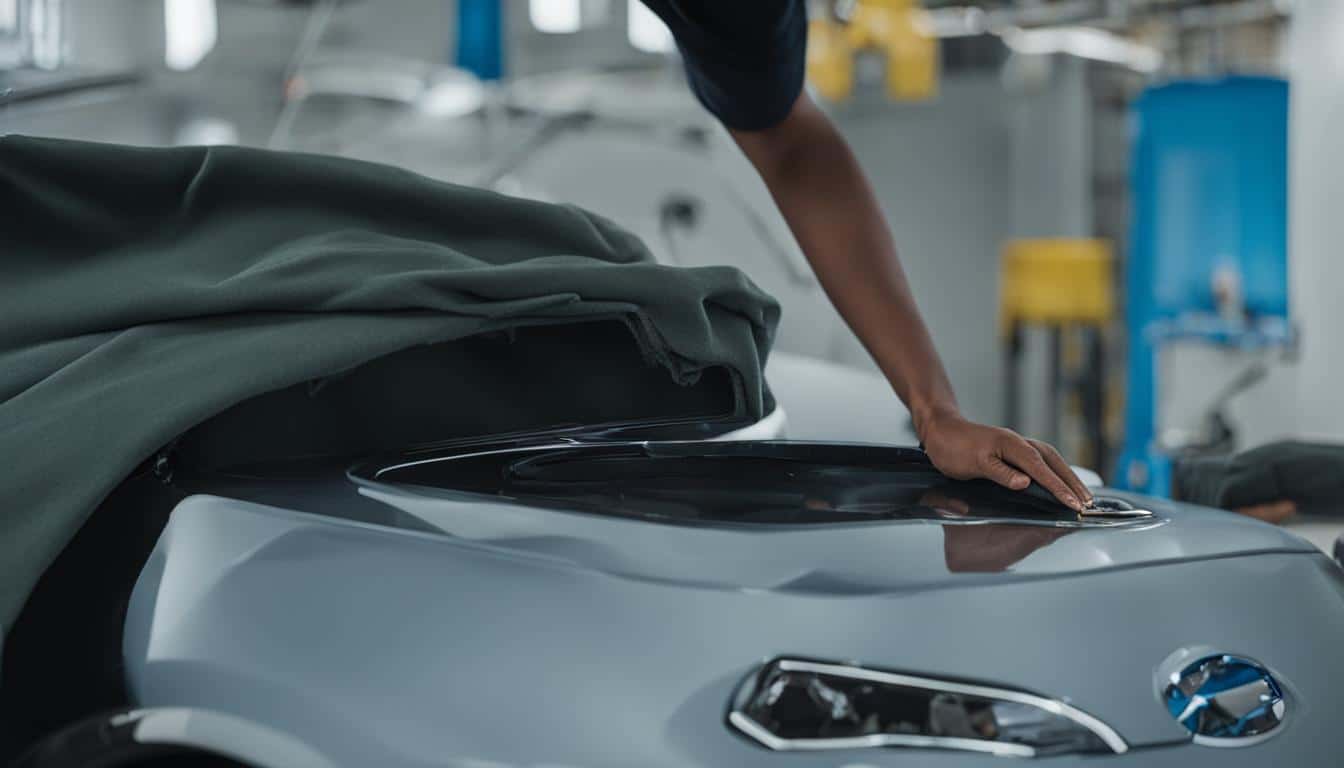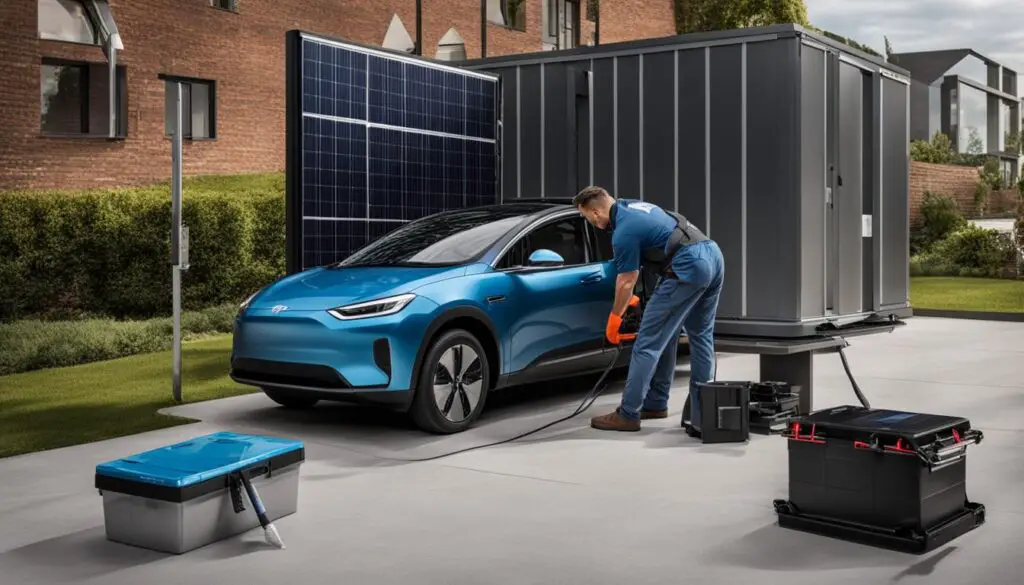
Do’s and Don’ts of Electric Vehicle Battery Maintenance
As an EV owner, ensuring proper maintenance of your electric vehicle (EV) battery is crucial for its long-term performance and lifespan. By following the right practices, you can maximize the efficiency of your battery and extend its overall durability. Let’s explore some important do’s and don’ts of EV battery maintenance to help you make the most out of your electric vehicle.
Key Takeaways:
- Regular maintenance and care are essential for maximizing the lifespan of your EV battery.
- Charging your EV battery within recommended limits can help maintain its health and performance.
- Avoid discharging your battery entirely to zero percent and charging it beyond 80 percent capacity for optimal battery life.
- Extreme temperatures can impact EV battery performance, so try to store your vehicle in a moderate temperature range when possible.
- Adopting moderate driving habits and avoiding aggressive driving can help preserve your battery’s health and lifespan.
EV Battery Charging Tips
Effective EV charging practices are essential for maintaining the health and longevity of your electric vehicle (EV) battery. Understanding the different levels of charging available for EVs – Level 1, Level 2, and Level 3 (DC Fast Charging) – can help you make informed charging decisions.
Level 1 Charging:
Level 1 charging utilizes a standard 120-volt electric outlet, commonly found in residential settings. This charging method offers convenience but requires more time to fully charge your electric car. On average, it takes about 12 hours to charge an EV completely using Level 1 charging.
Level 2 Charging:
Level 2 charging operates at a higher voltage of 220 volts and requires an appropriate charging station or outlet installation. Unlike Level 1 charging, Level 2 charging significantly reduces charging time, taking only about half the time to charge your EV fully. A Level 2 charger is commonly installed in homes, workplaces, and public charging stations.
Level 3 Charging (DC Fast Charging):
Level 3 charging, also known as DC Fast Charging, is designed for quick charging at public EV charging stations. This charging method utilizes a higher voltage direct current and can provide an 80 percent charge to your EV in approximately 30 minutes. It is important to note that not all EV models support Level 3 charging, and it’s best suited for long trips or when fast charging is necessary. Regular use of Level 3 charging can put additional stress on the battery, so it’s advisable to rely on Level 1 or Level 2 charging for routine charging needs.
Charging your EV battery overnight using Level 1 or Level 2 charging is recommended for daily usage, as it allows for a gradual and efficient charging process. Level 3 charging should be used sparingly and strategically to avoid excessive battery stress and degradation.
Best Practices for EV Battery Maintenance
To maintain the lifespan and performance of your EV battery, it is important to follow these best practices:
- Avoid charging your EV battery over 80 percent: Charging your battery to its maximum capacity adds stress to the battery pack and can potentially reduce its longevity. It is recommended to stop charging your EV once it reaches 80 percent.
- Avoid discharging the battery entirely to zero percent: Fully discharging the battery on a regular basis can also have negative effects on its lifespan. It is best to keep your battery above 20 percent charge to maintain optimal performance.
- Use a DC Fast Charger occasionally: While Level 1 and Level 2 charging are suitable for daily usage, it is acceptable to utilize a DC Fast Charger when necessary. However, relying solely on DC Fast Charging may impact the overall health of your battery in the long run.
- Maintain a moderate temperature range: Extreme temperatures can have a detrimental effect on EV battery performance and lifespan. It is recommended to park your EV in shaded areas or garages to minimize exposure to excessive heat or cold. Keeping your EV in a moderate temperature range can help optimize battery performance and extend its range.
By following these best practices, you can ensure the longevity and efficiency of your EV battery, maximizing its overall performance and range.

| Best Practices for EV Battery Maintenance | Benefits |
|---|---|
| Avoid charging over 80 percent | Reduces stress on the battery pack |
| Avoid discharging to zero percent | Preserves battery lifespan |
| Use DC Fast Charger occasionally | Suitable for emergency or long trips |
| Maintain moderate temperature range | Optimizes battery performance |
Impact of Weather on EV Batteries
Weather conditions can have a significant impact on the performance of your EV battery. Whether it’s extreme heat or freezing cold temperatures, the weather can affect the range and efficiency of your electric vehicle. In fact, in very cold weather, the range of an EV can be reduced by up to 40 percent.
One of the ways to mitigate the impact of extreme weather conditions on your EV battery is to store your vehicle in a garage when possible. By protecting your EV from exposure to extreme temperatures, you can help maintain the battery’s health and performance.
Extreme heat can also take a toll on your EV battery, so it’s important to keep your vehicle parked in shaded areas and avoid leaving it under direct sunlight for prolonged periods. By minimizing exposure to high temperatures, you can help preserve the efficiency and overall lifespan of your EV battery.
When it comes to EV battery performance during cold weather, it’s crucial to note that cold temperatures can reduce the driving range of your electric vehicle. The cold weather range reduction can vary depending on the specific model and battery type, but it’s generally advisable to ensure that your EV is fully charged before driving during colder months.
Additionally, utilizing pre-conditioning features available in some EV models can help optimize battery performance in cold weather. Pre-conditioning allows you to warm up or cool down the cabin and battery pack while the vehicle is still connected to a charger, reducing the strain on the battery during your journey.
Battery Degradation and Range Loss
Over time, EV batteries may experience some degree of battery degradation, resulting in range loss. It is normal to experience a 5 percent loss of range per 100,000 miles of travel. However, proper charging practices and maintenance can help minimize degradation and ensure optimal EV battery lifespan and EV battery health.
EV manufacturers employ battery management systems to optimize battery performance based on factors like temperature, driving behavior, and time. Regular monitoring of battery health and addressing any potential issues can help maintain the battery’s longevity.
| Factors affecting battery degradation and range loss: | Impact on EV battery lifespan and health: |
|---|---|
| High temperature exposure | Accelerated degradation and reduced range |
| Frequent fast charging | Potential increase in battery degradation |
| Deep discharges or overcharging | Higher risk of battery capacity loss |
| Cold weather conditions | Temporary reduction in range |

It is important to understand that battery degradation and range loss are natural processes that occur over time. However, by implementing proper charging methods, maintaining moderate temperature conditions, and driving responsibly, EV owners can prolong the lifespan of their batteries and optimize their driving range.
Driving Habits and Battery Life
When it comes to maintaining the lifespan of your EV battery, your driving habits play a significant role. Aggressive driving, frequent accelerating, and unnecessary braking can put stress on the battery and lead to reduced longevity. To preserve the health of your EV battery, it is advised to adopt moderate driving habits and prioritize smooth and steady driving.
By maintaining a consistent speed and avoiding rapid acceleration, you can minimize the strain on the battery and optimize its performance. Moderate acceleration ensures that the battery doesn’t experience unnecessary stress, allowing it to operate efficiently over time.
Adopting a mindful approach to your driving habits not only benefits your EV battery but also contributes to a safer and more enjoyable driving experience. By practicing moderation and restraint behind the wheel, you can extend the lifespan of your battery and enhance the overall driving experience.
Remember, your EV battery is designed to provide optimal performance under normal driving conditions. By avoiding aggressive driving behaviors and embracing a more measured approach, you can help reduce battery stress and maximize its lifespan.
Next, we will explore the impact of weather on EV batteries, discussing how extreme temperatures and other weather conditions can affect battery performance and range.
Future Battery Innovations
The future of electric vehicle (EV) batteries is filled with exciting possibilities. Ongoing research and development in battery technology are expected to lead to significant breakthroughs, bringing higher intensity, extended range, and reduced costs to lithium-metal batteries. These advancements will revolutionize the EV industry and contribute to a more sustainable future.
Lithium-metal batteries are anticipated to be at the forefront of this battery revolution. These batteries offer higher energy density, meaning they can store more power in a smaller package. With increased energy density, EVs can have longer ranges and improved performance. Additionally, lithium-metal batteries have the potential to be less expensive to produce, making EVs more accessible to a wider range of consumers.
Artificial intelligence (AI) will play a crucial role in driving battery technology forward. AI algorithms can optimize battery performance by analyzing various parameters such as temperature, usage patterns, and charging habits. This data-driven approach enables more efficient battery usage, prolonging the lifespan and improving overall battery performance.
In addition to lithium-metal batteries and AI advancements, the future of battery technology will also focus on sustainability. The recycling of battery materials, including lithium, cobalt, and copper, will become increasingly important. By implementing effective recycling processes, the industry can reduce costs and lessen the dependence on global raw material prices.
Summary: Future Battery Innovations
The future of EV batteries holds immense potential. Battery breakthroughs such as lithium-metal batteries, combined with advancements in AI and battery recycling, will drive greater energy intensity, increased range, and lower costs. These innovations will undoubtedly shape the future of the EV industry, paving the way for more sustainable and efficient transportation.
Conclusion
Proper maintenance and care are crucial for maximizing the lifespan and performance of your EV battery. By following the do’s and don’ts of EV battery maintenance, you can ensure optimal battery health and longevity.
First and foremost, it is essential to charge your EV within the recommended limits. Charging your battery up to 80 percent and avoiding full discharge to zero percent can help reduce stress on the battery pack.
Avoid exposing your EV to extreme temperatures whenever possible. Extreme heat or cold can significantly impact the range and efficiency of your battery. Whenever feasible, store your EV in a garage to maintain a moderate temperature and promote battery health.
Additionally, practicing moderate driving habits can preserve your battery’s life. Avoid aggressive driving, rapid acceleration, and unnecessary braking, as these habits can put stress on the battery and reduce its lifespan.
As battery technology continues to evolve, future innovations hold even greater potential for enhancing EV performance and sustainability. Stay informed about the latest advancements in EV batteries, such as lithium-metal batteries and the integration of artificial intelligence, as they promise higher intensity, increased range, and lower costs.
By prioritizing EV battery maintenance and staying up to date with the latest developments, you can enjoy optimal performance and extend the lifespan of your EV battery for years to come.
FAQ
What are the do’s and don’ts of electric vehicle battery maintenance?
Do’s and don’ts of electric vehicle battery maintenance include charging within recommended limits, avoiding extreme temperatures, and practicing moderate driving habits.
What are the EV battery charging tips?
EV battery charging tips include using Level 1 or Level 2 charging for daily usage, charging overnight, and sparingly using Level 3 charging or DC Fast Charging.
What are the best practices for EV battery maintenance?
Best practices for EV battery maintenance include charging the battery within recommended limits (up to 80 percent), avoiding complete discharge to zero percent, and relying on Level 1 or Level 2 charging for daily usage.
How does weather impact EV batteries?
Extreme temperatures can affect the range and efficiency of EV batteries. Cold weather can reduce the range of an EV by up to 40 percent. Storing the EV in a garage can help mitigate the impact of extreme temperatures on battery health.
What is battery degradation and range loss?
Over time, EV batteries may experience degradation, resulting in range loss. It is normal to expect a 5 percent loss of range per 100,000 miles of travel. Regular monitoring of battery health and addressing potential issues can help minimize degradation.
How do driving habits affect EV battery life?
Aggressive driving, frequent acceleration, and unnecessary braking can put stress on batteries and reduce their lifespan. Practicing moderate driving habits, maintaining a steady speed, and avoiding rapid acceleration can help preserve battery health.
What can we expect for the future of battery innovation?
The future of battery innovation holds exciting possibilities, including advancements in lithium-metal batteries that provide higher intensity, increased range, and lower costs. Artificial intelligence (AI) and other technologies will contribute to improving battery performance, safety, and efficiency.
